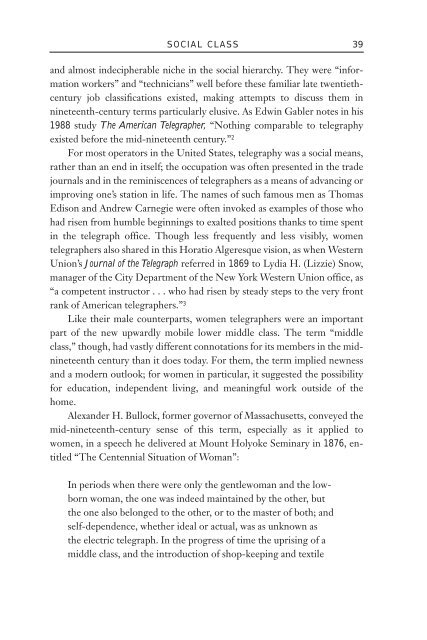My Sisters Telegraphic: Women in the Telegraph Office ... - Monoskop
My Sisters Telegraphic: Women in the Telegraph Office ... - Monoskop
My Sisters Telegraphic: Women in the Telegraph Office ... - Monoskop
Create successful ePaper yourself
Turn your PDF publications into a flip-book with our unique Google optimized e-Paper software.
SOCIAL CLASS 39<br />
and almost <strong>in</strong>decipherable niche <strong>in</strong> <strong>the</strong> social hierarchy. They were “<strong>in</strong>formation<br />
workers” and “technicians” well before <strong>the</strong>se familiar late twentiethcentury<br />
job classifications existed, mak<strong>in</strong>g attempts to discuss <strong>the</strong>m <strong>in</strong><br />
n<strong>in</strong>eteenth-century terms particularly elusive. As Edw<strong>in</strong> Gabler notes <strong>in</strong> his<br />
1988 study The American <strong>Telegraph</strong>er, “Noth<strong>in</strong>g comparable to telegraphy<br />
existed before <strong>the</strong> mid-n<strong>in</strong>eteenth century.” 2<br />
For most operators <strong>in</strong> <strong>the</strong> United States, telegraphy was a social means,<br />
ra<strong>the</strong>r than an end <strong>in</strong> itself; <strong>the</strong> occupation was often presented <strong>in</strong> <strong>the</strong> trade<br />
journals and <strong>in</strong> <strong>the</strong> rem<strong>in</strong>iscences of telegraphers as a means of advanc<strong>in</strong>g or<br />
improv<strong>in</strong>g one’s station <strong>in</strong> life. The names of such famous men as Thomas<br />
Edison and Andrew Carnegie were often <strong>in</strong>voked as examples of those who<br />
had risen from humble beg<strong>in</strong>n<strong>in</strong>gs to exalted positions thanks to time spent<br />
<strong>in</strong> <strong>the</strong> telegraph office. Though less frequently and less visibly, women<br />
telegraphers also shared <strong>in</strong> this Horatio Algeresque vision, as when Western<br />
Union’s Journal of <strong>the</strong> <strong>Telegraph</strong> referred <strong>in</strong> 1869 to Lydia H. (Lizzie) Snow,<br />
manager of <strong>the</strong> City Department of <strong>the</strong> New York Western Union office, as<br />
“a competent <strong>in</strong>structor . . . who had risen by steady steps to <strong>the</strong> very front<br />
rank of American telegraphers.” 3<br />
Like <strong>the</strong>ir male counterparts, women telegraphers were an important<br />
part of <strong>the</strong> new upwardly mobile lower middle class. The term “middle<br />
class,” though, had vastly different connotations for its members <strong>in</strong> <strong>the</strong> midn<strong>in</strong>eteenth<br />
century than it does today. For <strong>the</strong>m, <strong>the</strong> term implied newness<br />
and a modern outlook; for women <strong>in</strong> particular, it suggested <strong>the</strong> possibility<br />
for education, <strong>in</strong>dependent liv<strong>in</strong>g, and mean<strong>in</strong>gful work outside of <strong>the</strong><br />
home.<br />
Alexander H. Bullock, former governor of Massachusetts, conveyed <strong>the</strong><br />
mid-n<strong>in</strong>eteenth-century sense of this term, especially as it applied to<br />
women, <strong>in</strong> a speech he delivered at Mount Holyoke Sem<strong>in</strong>ary <strong>in</strong> 1876, entitled<br />
“The Centennial Situation of Woman”:<br />
In periods when <strong>the</strong>re were only <strong>the</strong> gentlewoman and <strong>the</strong> lowborn<br />
woman, <strong>the</strong> one was <strong>in</strong>deed ma<strong>in</strong>ta<strong>in</strong>ed by <strong>the</strong> o<strong>the</strong>r, but<br />
<strong>the</strong> one also belonged to <strong>the</strong> o<strong>the</strong>r, or to <strong>the</strong> master of both; and<br />
self-dependence, whe<strong>the</strong>r ideal or actual, was as unknown as<br />
<strong>the</strong> electric telegraph. In <strong>the</strong> progress of time <strong>the</strong> upris<strong>in</strong>g of a<br />
middle class, and <strong>the</strong> <strong>in</strong>troduction of shop-keep<strong>in</strong>g and textile

















